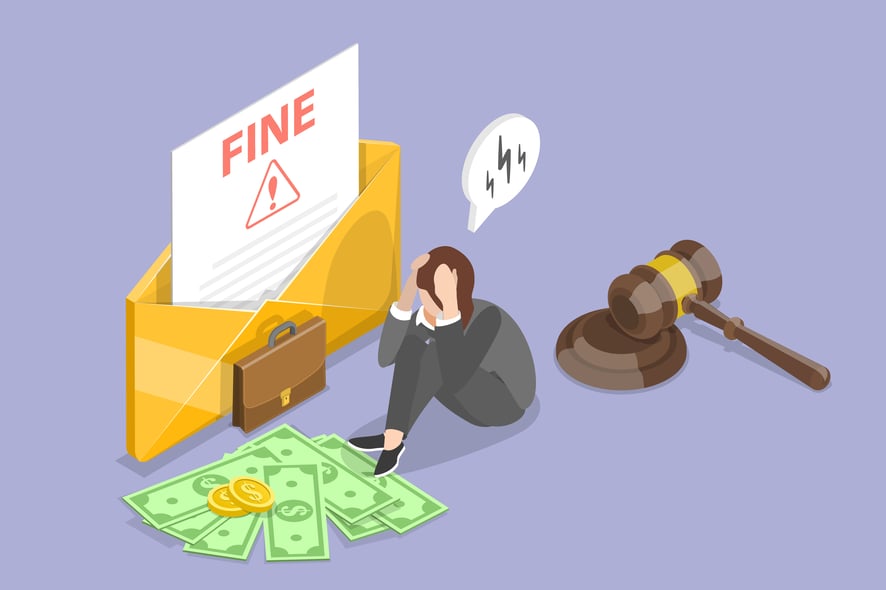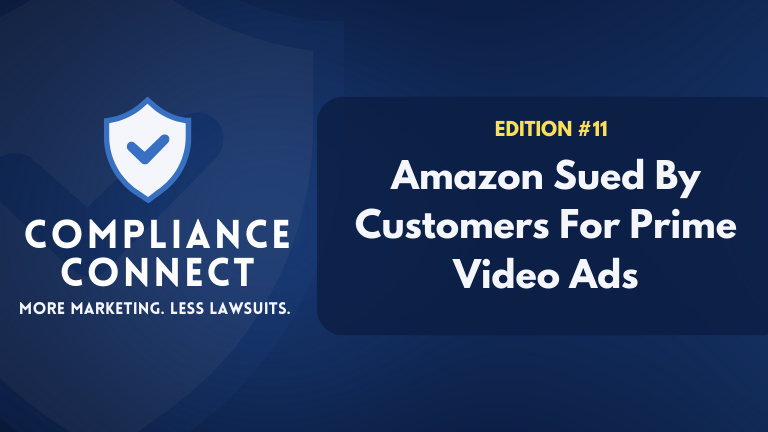Good morning! This is the eleventh edition of the Compliant Connect newsletter.
The goal is simple: to keep you in the loop on what the FTC and other regulatory agencies are up to so that you can protect yourself.
These newsletters will land in your inbox twice a week – Mondays and Thursdays.
Remember: this is NOT legal advice, only information!
Here’s the rundown today…
- 📺 Amazon Sued Over Prime Video Ads “Deception”
- 🏨 FTC Settles With Hotel Giant
- 🚨 Update On The Amazon Anti-Trust Case
- 🗽 New York’s Unusual LLC Requirement
- 💸 How The FTC Determines Its Fines
Compliance Digest: What You Should Read Today
Amazon Moves To Dismiss Class Action Lawsuit Over Prime Video Ads
Amazon is trying to dismiss a class-action lawsuit from Prime Video users who claim that adding ads by default violates their agreement.
For context, in until the end of 2023, there were no ads on Prime Video, with a few minor exceptions.
Then in December, Amazon notified Prime members that in 30 days, they would play ads at the beginning of videos unless users paid an extra $2.99/month.
The problem is that many subscribers had signed up for ANNUAL subscriptions under the belief that Prime Video would be ad-free. Now Amazon was asking them to pay an extra fee to get what they already believed they had paid for.
Amazon is accused of deceptive marketing practices for this alleged “bait and switch.”
Amazon argues that its terms and conditions clearly state that Prime benefits, including ad-free content, are subject to change. Amazon claims that it never promised ad-free content and has offered an option to pay for ad-free viewing for those who prefer it.
FTC Settles With Marriott Over Data Breaches
Marriott is a major hotel chain, managing over 7,000 properties worldwide.
The FTC is now requiring them to enhance their data security following three major breaches that affected 344 million customers.
They must provide customers a way to request data deletion and restore stolen loyalty points.
Additionally, Marriott will pay $52 million to settle similar allegations with 49 states and D.C., and implement a 20-year security program with regular independent assessments.
Here is Marriott’s press release where they admit to no wrongdoing.

Update On The Amazon Anti-Trust Case
Last week, we discussed how a federal judge partially dismissed the FTC’s antitrust lawsuit against Amazon. The ruling was sealed, so we didn’t know many details.
On Monday the ruling was unsealed, and we learned that only some state charges were dismissed. The FTC’s case is allowed to proceed.
While the case is allowed to proceed, the outcome is uncertain.
While the ruling allows the FTC to make its case, as Amazon’s spokesperson Tim Doyle said, “Moving forward the FTC will have to prove its claims in court.”
This is a process that could take years to play out. Remember, Facebook was sued back in 2020 and that case still hasn’t gone to trial.
Why The FTC Is Targeting Amazon
In its complaint last year, the FTC accused Amazon of using a variety of tactics to block competitors and force sellers to comply with its high-cost services.
Specific allegations include…
#1 – Anti-discounting practices
Amazon punishes sellers who offer lower prices on other platforms by making their products less visible on Amazon, which keeps prices higher across the internet.
#2 – Restrictive conditions on Prime eligibility
Amazon requires sellers to use its costly fulfillment services to qualify for Prime, limiting competition.
#3 – Biasing search results
Amazon allegedly prioritizes its own products and paid ads over competitors’, which impacts both product visibility and customer experience.
#4 – High fees for sellers
Amazon charges fees that can take up to 50% of a seller’s revenue, increasing costs for both sellers and consumers.
This Is A Part Of A Larger Anti-Trust Effort
Under Lina Khan’s leadership, the FTC has prioritized anti-trust.
They are targeting companies – especially large tech companies – that they accuse of using their size to create unfair competitive environments.
That’s why in addition to the ongoing actions against Amazon, the FTC is suing Facebook and sued to block a merger by the pharmaceutical giant Amgen.
In addition, the Justice department launched high-profile lawsuits against Apple and Google.
This effort has support among both Democrats and Republicans. However, it is also opposed by members of both parties. Since all of these cases will take years to unfold, the outcome of the upcoming election could determine whether these efforts continue.
Did You Know…
If you form an LLC in New York, you must announce it in 2 newspapers in the county where the business is located. In New York City that could cost you well over $1000!

Quick Compliance Tip: How The FTC Determines Its Fines
If your business is targeted by the FTC, you will probably need to pay a fine. As part of a settlement, they will demand a SPECIFIC number for consumer redress.
They’ll start with the “judgement” amount, which is the total amount of customer harm that they calculate. This is often much higher than the business owner has in assets.
You can’t negotiate this amount, even if you disagree with the judgement amount.
You can lean on something called “ability to pay.”
In order to qualify, you need to agree to reveal ALL of your financials. Every penny, every collectible, every trust, every property, every crypto, all of it.
Based on what you have that is “available relatively quickly,” they will determine what you can pay at that time.
- Real estate? They can ask you to sell it.
- Cars? They can ask you to sell them.
- Crypto? Convert it.
- Stocks? Cash out.
If it’s LIQUID, it goes into the calculation, and their goal is to take a substantial amount of that figure.
Based on his experience, Greg believes that every case is different and the level of your infractions seem to play a role in how flexible the FTC will be.
In general, your most vulnerable assets are liquid cash and liquid investments.
The FTC tends not to go after your primary residence, although they certainly can.
In the end, the FTC has many players they want to go after so settling is also in their favor.
But don’t think that you can bluff them. If they need to go to court, they absolutely will.
